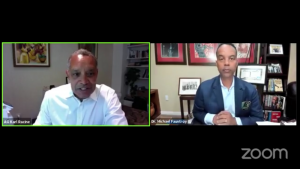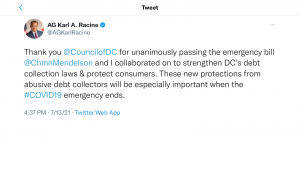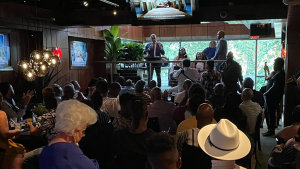Gun violence and violent crime are impacting the entire District, and residents deserve a thoughtful and long-term response.
Last Friday, six-year-old Niyah Courtney was shot and killed. The next day, tens of thousands of fans at Nationals Park dove for cover thinking that they were in the middle of an active shooter situation. Yesterday, residents near Logan Circle ran for cover as shots were fired and two men were shot.
These are appalling and gut-wrenching events. My heart goes out to the victims and loved ones of those directly impacted by these incidents and the community members shaken by the trauma of this violence in our city.
Gun violence is hurting our whole community, ripping apart families, and creating fear and trauma. No one wants to fear for their children’s lives as they go to school or walk down the street. But in parts of the District, that is a daily reality. Violence has long plagued neighborhoods that too often get overlooked—particularly low-income communities of color. District residents deserve to feel safe in their homes and their neighborhoods, and when they are walking down the street with their families.
It is our job as elected leaders to do everything we can to stop gun violence and violent crime, prevent more senseless deaths, and make every part of the District safer. I may not have all the answers, but my office is doing everything we can to stop the gun violence and violent crime in our community now and in the future.
Our city needs a proactive, comprehensive plan. It needs a clear, consistent, and all-hands-on-deck approach. Some of these steps include action my office is already taking, and some are bigger than my office alone. But we must work together to make meaningful progress.
First, we need aggressive gun safety reform. There are too many guns flooding our city, and there are too many loopholes that enable the floodgates to remain open. We need federal legislation that closes these loopholes, mandates background checks, and helps stop the flow of guns across our country and into our city. My office is fighting the prevalence of illegal ghost guns in the District, which lack serial numbers and can’t be traced. We are suing Polymer80—a leading manufacturer of ghost guns in the United States and the company that manufactured the majority of deadly ghost guns recovered in DC—for illegally advertising and selling them to DC consumers. And we have advocated for strong federal regulation of these firearms.
Second, we must fully invest in community-driven, evidence-based violence interruption programs. We know based on research and data that empowering communities to interrupt violence, intervening with those most likely to commit or be victims of violence, and changing norms around violence can have a long-lasting impact. That’s why we launched Cure the Streets in several neighborhoods that have historically experienced some of the highest rates of gun violence. This public health approach to treating violence is working in these neighborhoods. We’re asking the DC Council to fund an expansion of Cure the Streets so it can operate in more neighborhoods. We’re grateful that the Council took the first steps to expanding the program by adding one additional site in its budget vote earlier this week. But more neighborhoods would benefit from a site. There are also other important violence interruption programs operating around the city that deserve support and investment as well.
Third, we need to hold individuals accountable when they commit crimes and change their behavior so they are less likely to reoffend in the future. As the prosecutor for crime perpetrated by young people in the District, when a case is referred to my office for prosecution, we assess the needs of the victim and the impact of the conduct on public safety. Then, we work to achieve a resolution that supports victims while doing what needs to be done to change the behavior of the youth. This approach helps reduce recidivism and makes our communities safer. We do this so they do not become future violent offenders and instead become contributing members of our communities. And, when appropriate, we prosecute.
Finally, we need to address the root causes of crime in our communities, including poverty, hopelessness, and trauma – to break the cycle of violence. This is a public health crisis as much as it is a public safety crisis. We know there are two Washington, DCs – and our communities east of the river, where most of the gun violence is happening, need investment and support. But too often they are not even part of the conversation. Only when we address the challenges these communities face every day can we make real progress now and in the future.
These are critical steps, but they are not the only solutions. We need more ideas for making the District a safer, more equitable place. We must be thoughtful about our efforts and careful to avoid reactionary tough-on-crime approaches that we know do not actually improve public safety.
Violent crime is on the rise across the country. The District is not immune from it. But that doesn’t excuse us from tackling our problem locally. Unfortunately, the response to gun violence, especially when it happens in Black and brown communities, follows a familiar pattern: thoughts and prayers, vigils, and calls for reform, and then a return to the status quo. All of us have a role to play in stopping this violence, and I will continue to work with the mayor, our law enforcement partners, the Council, advocates, and others to marshal resources, ingenuity, and bold ideas to bring about change.
Read my full statement from earlier this week on my new Medium page.

Karl A. Racine
Attorney General
A History of DC: A Conversation on DC's History and Long Fight for Autonomy
Last Friday, I hosted a Take 30 discussion featuring special guest Dr. Michael Fauntroy, Associate Professor and Director of the Race, Politics, and Policy Center at George Mason University Schar School of Policy and Government. During our conversation, we discussed some of the lesser-known history of the District, the city’s long struggle for autonomy, and how it has impacted our fight for DC statehood. This conversation was so riveting that I asked Dr. Fauntroy to come back again soon for another Take 30 to continue our conversation. We'll keep you posted on when it's scheduled. It is so important for all Americans—DC-residents and those across the country—to learn the history of our fight for autonomy, understand how racism thwarted those efforts, and remember how our fight for statehood continues. In case you missed it, you can watch it here.
Celebrating the Passage of Legislation to Protect DC Consumers from Abusive Debt Collection Practices
Last week, the DC Council passed emergency legislation—introduced by Chairman Mendelson in collaboration with my office— that will protect DC consumers from abusive and unfair debt collection practices after the District’s temporary COVID-19 protections end and debt collection activity resumes. Our legislation modernizes the District’s outdated debt collection law, which was written in 1971 and does not currently cover most types of consumer debt, including medical debt and credit card debt. And it ensures that necessary and long overdue consumer protections are in place when debt collection relief provided by the District’s COVID-19 public health emergency legislation expires. By passing our urgently needed legislation, the Council is making sure District residents will be protected from abusive, unfair, and misleading debt collection practices during this critical time when District residents are still trying to get back on their feet after losing jobs or struggling to care for their families during the pandemic. We look forward to working with the Council to make these much-needed protections for District residents permanent.
Celebrating Black Pride
On Wednesday, the Center for Black Equity (CBE) hosted its 30th Annual Black Pride Award Celebration, where I was honored with this year’s DC Black Pride Eleanor Holmes Norton Award. This award is presented annually to an individual for outstanding political leadership on behalf of the Black LGBTQ+ community. It was an honor to receive this award named for a civil rights hero from CBE for my office’s advocacy for LGBTQ+ rights. Our office works every day to ensure that everyone can live, learn, grow, work, and love free from hate and discrimination—and we will keep up that fight.
Suing Google for Antitrust Violations Over Android App Store
Earlier this month, I worked with 36 other attorneys general to file a new antitrust lawsuit against Google. We alleged the company used its dominance to unfairly restrict competition with the Google Play Store for Android mobile devices and forced app developers to use its payment processor, Google Billing, as a middleman for in-app purchases. Google is using its dominant position in the marketplace to stifle competition and extract billions of dollars in commissions on in-app purchases from unsuspecting consumers. This anticompetitive behavior must stop. Our lawsuit also alleges that Google misrepresented security risks of apps distributed outside of the Play Store to keep consumers using its app store and paying its higher prices—including its commission of up to 30%. My office will not allow Google or any other company to harm District residents. We have fought, and will continue to fight, big tech companies that abandon the principles of fair competition that originally enabled their success and who instead profit by illegally maintaining a monopoly position.




